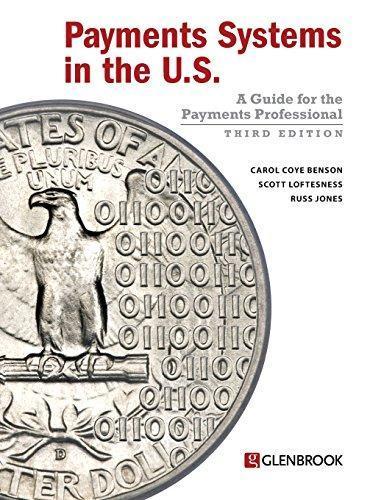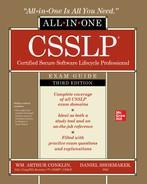Safety Professionalu2019s Reference and Study Guide, Third Edition
https://ebookmass.com/product/safetyprofessionals-reference-and-study-guide-thirdedition/
Download more ebook from https://ebookmass.com
More products digital (pdf, epub, mobi) instant download maybe you interests ...
Payments Systems in the U.S. u2013 Third Edition : A Guide for Professional 3rd
https://ebookmass.com/product/payments-systems-in-the-u-s-thirdedition-a-guide-for-professional-3rd/
Nutrition for Dental Health: A Guide the Professional Third Edition
https://ebookmass.com/product/nutrition-for-dental-health-aguide-the-professional-third-edition/
CSSLP
EXAM GUIDE, Third Edition, 3rd Edition Wm. Arthur
Conklin & Daniel Paul Shoemaker
https://ebookmass.com/product/csslp-secure-software-lifecycleprofessional-all-in-one-exam-guide-third-edition-3rd-edition-wmarthur-conklin-daniel-paul-shoemaker/
EXAM GUIDE, Third Edition, 3rd Edition Wm. Arthur
Conklin & Daniel Paul Shoemaker
https://ebookmass.com/product/csslp-secure-software-lifecycleprofessional-all-in-one-exam-guide-third-edition-3rd-edition-wmarthur-conklin-daniel-paul-shoemaker-2/
Williams Gynecology. Study guide 3rd Edition Claudia L. Werner
https://ebookmass.com/product/williams-gynecology-studyguide-3rd-edition-claudia-l-werner/
LPI Linux Essentials Study Guide 3rd Edition Christine Bresnahan
https://ebookmass.com/product/lpi-linux-essentials-studyguide-3rd-edition-christine-bresnahan/
Stagecraft Fundamentals: A Guide and Reference for Theatrical Production 3rd Edition, (Ebook PDF)
https://ebookmass.com/product/stagecraft-fundamentals-a-guideand-reference-for-theatrical-production-3rd-edition-ebook-pdf/
CCSP Certified Cloud Security Professional. Exam Guide 3rd Edition Unknown
https://ebookmass.com/product/ccsp-certified-cloud-securityprofessional-exam-guide-3rd-edition-unknown/
Official Google Cloud Certified Professional Data Engineer Study Guide 1st Edition Dan Sullivan
https://ebookmass.com/product/official-google-cloud-certifiedprofessional-data-engineer-study-guide-1st-edition-dan-sullivan/
Another random document with no related content on Scribd:
by the circumstances of an adventurous career and the sentiments and habits of a turbulent age. His tastes inclined to literature and art, but necessity developed in him the talents of a cautious negotiator and skilful general. Of a generous and benevolent disposition, the proscription of his family, the perpetual hostility of his enemies, the treachery of his kindred, and the ingratitude of his friends embittered his spirit, and led to acts of cruelty, which, though justified by political expediency, have greatly tarnished the lustre of his fame. Reared amidst the splendors of the most polished and luxurious of courts, he bore with singular equanimity the reverses of fortune and the evils of abject poverty, trials which, by inculcating the virtue of philosophical resignation and acquainting him with the failings and inconsistencies of humanity, the better prepared him for the high and responsible position he was destined subsequently to occupy. Even before his power had been firmly established, he sent messengers to the remote regions of the East to search for the scattered members and dependents of the Ommeyades, who were conducted to Spain at the public expense, granted estates, and not infrequently appointed councillors or governors of cities and provinces. The versatility of his genius provoked the envy and elicited the admiration of his most determined foes. While his attention was still occupied by resisting the encroachments of the mountaineers of the Asturias and the suppression of formidable insurrections, he successfully repelled the invasions of two powerful and warlike sovereigns in whose jurisdiction were included the most opulent and productive regions of the globe. Charlemagne, the greater of these, offered him the hand of his daughter and urged the alliance, which was declined on account of his failing health. Fertile in resources, the privations and sorrows of youth had taught him to bear adversity in silence if not with complacency. Thorough familiarity with the character of Berber and Arab convinced him that the pretensions of the children of the Desert were incompatible with the submission requisite to the exercise of royal authority, and he did not hesitate to crush, with a relentless hand, the insolence or the presumptuous freedom of a tribesman or a friend. Popular at first, this unusual severity in time alienated the warmest supporters of his
throne. Inexorable necessity, the principles of self-protection and self-preservation, dependent upon conditions not unusual after a protracted period of revolution and anarchy, rendered the establishment of a despotism imperative. Once founded, it was maintained by an army of forty thousand mercenaries, chiefly recruited from the barbarians of Africa, enlisted with multitudes of enfranchised slaves, who were bound to the interests of the monarchy by the double tie of dependence and gratitude. The romantic spirit of adventure often impelled Abd-al-Rahman, in the early years of his reign, to wander in disguise through the streets of his capital; but the animosity engendered by frequent revolutions soon rendered this diversion too hazardous, and he was compelled to adopt the seclusion and the military precautions which provide for the security of royalty in the kingdoms of the Orient. The gradations of official rank, the territorial divisions of the empire, the duties of the magistracy, the regulations of police, were also, with slight modifications, framed after the pattern of similar institutions in the East. In these details of political organization the number twelve and its factors, so popular among nations of Semitic origin, were especially prominent. The Peninsula was divided into six provinces, each of which was subject to the jurisdiction of a military governor. Under the control of this dignitary were two walis and six viziers, who administered affairs of minor importance in their respective districts. These officials were assisted in their labors by a host of kadis and secretaries, who sent, at stated periods, regular reports of their proceedings to the Council, or Divan, at Cordova. The available moments of leisure, during a life of almost incessant conflict, were employed by Abd-al-Rahman in works intended for the improvement of the masses; in the perfection of regulations which encouraged the accumulation and permitted the unrestricted enjoyment of property; and in the promotion of educational and literary facilities, as well as in the institution of measures upon whose enforcement absolutely depended the continuance of his power. He repaired the Roman highways that traversed the Peninsula. He established a system of couriers, with relays of post-horses, for the rapid transmission of important despatches. He ruled the fierce outlaws of the Peninsula,
whose trade was rapine, and who considered mercy an indication of cowardice, by the only means they respected, the government of the sword. They hated and cursed him, they plotted against his life, they rejected his gifts and spurned his honors, but they obeyed his commands, for they stood in wholesome dread of his resentment, and had been taught, by many a bloody lesson, the consequences of disputing his authority. During his reign, for the first time since the Conquest, the nomadic propensity of the Berbers, the source of incessant disturbance and universal insecurity, was restrained, and these barbarians were compelled to conform to the laws and to choose a settled habitation. A code of judicature, adapted to the circumstances of a population composed of so many diverse and often hostile constituents, was framed, in whose statutes the useful institutions of the Visigoths were recognized under the general predominance of Moslem law.
Abd-al-Rahman made frequent excursions through his dominions, the better to familiarize himself with the conduct of his officers and the necessities of his subjects. His course was marked by charity to the needy; by munificent donations for public improvements; by institutions for the encouragement of the arts; by the erection of magnificent palaces and temples. But his generosity, ample elsewhere, was displayed with unprecedented lavishness in his capital, the object of his pride and of his peculiar affection. Its plan, its buildings, its fortifications, its suburbs, were modelled after those of beautiful Damascus. A palm-tree, the first ever seen in Spain, was brought from Syria, and planted in the court-yard of the royal palace as a memorial of the scenes of his childhood. In the environs of the city he laid out a garden, called Rusafah, after one formerly possessed by his grandfather, Hischem, and of which it was the counterpart. A mint was founded in Cordova, whose coins were identical in design, weight, and inscription with the pieces issued by the Ommeyade princes of Syria. The fame of the court and the reputation of the sovereign attracted to the Moslem capital of the West the learned and the polite of every clime. The spirit of literary emulation and philosophical inquiry, which attained such a
remarkable development under succeeding khalifs, began to be awakened. The sovereign himself composed with facility and correctness verses of considerable merit. His sons were provided with the best instruction that the age afforded; were compelled to be present during the transactions of the Divan and the business of the courts; and were frequently entrusted with the negotiation of treaties and the administration of government. The public taste was cultivated by periodical literary contests, in which the most accomplished scholars and poets of the day participated; where splendid rewards for proficiency were distributed; and whose proceedings were invested with additional prestige by the presence and supervision of royalty.
Neither the brutal skepticism of the court of Damascus nor the prevalent idolatry and blasphemy of Spain seem to have affected the piety of Abd-al-Rahman. Whether induced by motives of interest or by sincere belief, it is certain that he ever observed with scrupulous exactness the ceremonial of his faith. Fully alive to the advantages— social, political, commercial, and religious—connected with a splendid temple, which, by reason of its magnificence and its sanctity, might become a place of pilgrimage, he had long meditated the construction of such an edifice, an aspiration whose fulfilment was deferred for many years by continuous reverses of fortune. The possession of the cities of Mecca and Jerusalem by a hostile dynasty had vastly increased the difficulties imposed upon such Mussulmans of the Peninsula as desired to make the arduous journey to the venerated shrines of the East. Moreover, the subjects of the Ommeyade ruler were regarded with suspicion and dislike by the sovereigns of Bagdad; and Abd-al-Rahman had, from every pulpit in the realm of the Abbasides, been proclaimed a usurper, a rebel, and an impostor. The success that finally attended his arms, and insured the permanent establishment of his authority, also rendered possible the realization of a project dictated by a more noble and lofty ambition. His political sagacity detected at a glance the influence such a temple would exert over the minds of a highly imaginative and superstitious people. Its erection would gratify their national
pride. Its presence in the midst of the capital would consolidate and confirm the power of the state. The sentiment of loyalty still entertained by the descendants of Arabian exiles for the home of their fathers would be transferred to another land, whose shrine, if it did not equal that of Mecca in wealth, would certainly surpass it in grandeur and beauty. “My mosque,” said the great statesman, “will soon demand a khalif; my sons will assume that title; and the dispute between the East and West will be terminated forever. Our constitution is based entirely upon a religious principle, and my subjects will soon accustom themselves to see nothing beyond my children but the eye of Allah and the sword of the Prophet.”
In the turbulent times of the Conquest every place of worship possessed by the Christians in Cordova, save one, was destroyed. In the cathedral alone, whose ownership was insured by treaty, were the infidels permitted to perform the rites enjoined by their creed. In accordance with a custom prevalent in the East, where, however, it must be acknowledged, it was unusual, under ordinary circumstances, to violate engagements entered into with Christians, half of the cathedral had been forcibly appropriated and consecrated to the service of Islam. It was not many years, however, before its limited area was found inadequate to the requirements of the crowds of immigrants and proselytes that were daily added to the population of the growing capital. The location being the most desirable in the city, a proposition was made by Abd-al-Rahman for the purchase of the remaining half of the edifice. The bishop refused, on the reasonable ground that no other building would then be available for the celebration of the rites of the Christian faith. But the importunity of the Emir prevailed in the end; and the Christians obtained for their concessions the sum of a hundred thousand dinars, and, in addition, the extraordinary privilege of erecting a certain number of churches to replace those of which they had been deprived by the rage of fanaticism and the calamities of war.
The plan of the mosque was traced by Abd-al-Rahman himself, and the first stone of the foundation was laid by his own hands. Oppressed with age and physical infirmities, and haunted by a
presentiment that he would not live to see his work completed, he exhausted every effort to accelerate its progress. A vast number of laborers were employed. The assistance of the governors of distant provinces was invoked for the collection and transportation of materials. The emulation of the artisans was excited by the example of the enfeebled sovereign, who, for one hour every day, personally shared the toil of his humble companions. The vaults of the public treasury were opened without restriction for the benefit of an undertaking which appealed alike to the patriotic impulses and the religious sentiment of the nation. The work progressed with astonishing rapidity, but not fast enough to satisfy the feverish impatience of the illustrious architect. It was his desire while he yet had strength to perform in those sacred precincts, as the representative of the Prophet, the simple ceremonial of the faith so dear to the heart of every Mussulman. A space was cleared within the enclosure. An awning was raised, and the unfinished walls were hung with tapestry from the palace. There, surrounded with heaps of materials, with half-chiselled capitals and naked columns, the Emir, in his snowy robes of office, ascended the temporary pulpit, led the prayers, and directed the devotions of a vast concourse assembled from every quarter of the Moslem capital. It was the last important act of his life. A few weeks later the multitudes who had listened with silent reverence to his discourse in the Djalma followed his remains to the tomb.
Thus, his destiny accomplished and his task performed, died the founder of one of the greatest dynasties that Europe has ever known. He possessed, in ample measure, the attributes of a wise, a politic, an enlightened sovereign. His spirit had been chastened and his courage tried by many years of persecution and misfortune. The cruelty with which he has been reproached was a necessary consequence of the turbulent condition of the society he was called upon to govern. The solution of the political problem which confronted him was not a mere question of supremacy; it involved the integrity of the Saracen domination in the Peninsula and his own existence as a ruler and as an individual. Force was the only
argument used by his adversaries, and the only one they respected. The influence of the Koran was scarcely felt. The great majority of the inhabitants of Spain were Pagans and infidels. The Berbers, who largely preponderated, were fetich worshippers and believers in witchcraft and sorcery. Years of impunity and unrestricted license had rendered these wild barbarians more ferocious in disposition, more impatient of control. Public hostility and private feuds, the acrimonious disputes between contending sects, the alternate proscriptions of successful factions, the hope of future revenge, made permanent reconciliation impossible. In every community existed a large and compact body of enemies, different in nationality, antagonistic in faith, firmly united by the evils of common misfortune, who entertained, under a delusive aspect of submission, dangerous aspirations for political and religious liberty. Those nearest in blood to the monarch sought, with unnatural vindictiveness, the life of their kinsman and benefactor. In the Asturian mountains the power of a rising kingdom, established by a band of intrepid exiles, had begun seriously to encroach upon the Moslem possessions of the North. The arms of the most powerful sovereigns of Europe and Asia were directed, from the Mediterranean and from the Pyrenees, against a prince whose dominions were agitated and whose resources impaired by anarchy and sedition. Exasperated by the interference of the Abbasides, he long contemplated an expedition to the coast of Syria, a project which the obstinacy of his domestic enemies made impossible. Under such conditions government by the scimetar was certainly not inexcusable. These considerations demanded also the employment of foreign mercenaries. They stimulated the vigilance and justified the severity of the judicial tribunals. They prompted the cultivation of religious sentiments as an auxiliary of royal power by the erection of superb houses of worship. They suggested the statesmanlike expedient of diverting the attention of the populace from scenes of disorder, by the endowment of public institutions, by the cultivation of the arts, by the diffusion of knowledge.
Abd-al-Rahman was not, by nature, tyrannical. He was ever ready to listen to the complaints and redress the wrongs of the unfortunate. The most bitter partisanship never refused him the attribute of strict and impartial justice. If his severity was sometimes not tempered by compassion, it was never aggravated by deliberate cruelty. In his privacy he was affable; in his public conduct dignified; in his intercourse with his inferiors the embodiment of gentle courtesy. Temperate in his pleasures, the court of Cordova never exhibited the disgraceful scenes that offended religion and decency in the palaces and gardens of Damascus. Without him the Ommeyade dynasty of the West would never have existed; and without that dynasty a large portion of the treasures of ancient learning would have been forever lost; the spirit of scientific inquiry would have been crushed by ecclesiastical intolerance; the hopes of intellectual freedom suppressed; and the civilization of Europe retarded for many centuries.
From the accession of Abd-al-Rahman I. dates the autonomy of Moorish Spain under the Khalifate of the West. Its rulers, however, while enjoying all the power and attributes of independent sovereigns, and, as such, requiring the implicit obedience of their subjects and the recognition of foreign nations, did not, until the reign of Abd-al-Rahman III., publicly assume the title of Successors of the Prophet, but exercised their despotism under the less conspicuous appellation of Emirs, or Governors. Many inducements led to the adoption of this policy. Moslems still generally regarded the regions of the East as the source of orthodox belief and the seat of legitimate empire. The survivors of the House of Ommeyah were under the ban of the dynasty of Damascus and Bagdad. The conditions of society in the Peninsula were unsettled. Everywhere the slightest pretext for rebellion was welcomed with rejoicing by multitudes of desperate outlaws and fanatics. Ambitious enthusiasts lost no opportunity of inflaming the public mind, only too susceptible to agitation, whenever a revolt could increase their gains or contribute to their notoriety. The union of Church and State under the constitution of Islam made interference with the established
order of affairs doubly perilous. The premature appropriation of the venerated title of Khalif by the exiled Ommeyade princes would have entailed the reproach of sacrilege, and might have overturned their empire, neither founded on prescriptive right, supported by popular affection, nor maintained by adequate military force. The assertion of pretensions far less obnoxious to religious prejudice had frequently produced serious disorders. By such a claim the dignity of the greatest of Mohammedan dynasties could receive no accession commensurate with the risk it involved. Its princes might well, for a time, forego the titles while in full possession of the substance of power. Such were some of the politic considerations which long retained, in a nominally subordinate capacity, the most despotic and irresponsible monarchs of Europe.
The awakening of the national spirit consequent upon the civil wars of Spain not only permitted the organization of the kingdom of the Asturias, but it was also productive of a disaster scarcely less serious,—the loss of the Moslem possessions in France. From the day of his accession, the energies of Pepin were devoted to the conquest and expulsion of the Moorish colonists of Provence and Languedoc. The treason of a Gothic chieftain delivered into his hands the principal cities of Septimania, except Narbonne. That capital sustained a siege of more than six years’ duration, an intense prejudice against the Franks inducing the Roman and Gothic inhabitants to support the efforts of the Arab garrison; but in the end, the popular discontent and the hopeless prospect of assistance from Cordova impelled the prominent citizens to propose terms of accommodation with the enemy. A capitulation was arranged by which the besieged were to be conceded the privilege of government by their own laws, but at the last moment the Saracens refused their assent; hostilities were resumed, and the garrison, greatly outnumbered by the Christian mob, was annihilated. For forty-one years the laws, the customs, and the religion of the Moslems had prevailed in Southern France. The traces of their domination, as disclosed by the physical and mental characteristics of the peasantry, have not been effaced by the vicissitudes of more
than a thousand years. This temporary occupation, as will be seen hereafter, was also productive of a marked effect upon the manners and the polite literature of Europe, through the diffusion of HispanoArab culture, the influence of the lays of the troubadours, and the adoption of the laws of chivalry. The intercourse with the Khalifate of Spain, suspended for a period, was renewed; relations of even closer intimacy were established; a community of ideas, tastes, and sympathies developed sentiments of mutual esteem; and the characteristics of the brilliant and intellectual society of Cordova were reflected in the refined voluptuousness, the extensive learning, and the polished skepticism that subsequently distinguished the courts of the Albigensian princes.
CHAPTER IX
REIGN OF HISCHEM I.; REIGN OF AL-HAKEM I.
788–822
Custom of Royal Succession violated by the Will of Abd-al-Rahman Accession of Hischem Revolt of Suleyman and Abdallah They are routed and their Armies dispersed Clemency of the Emir Invasion of Septimania—Defeat of the Franks Indecisive Results of the Campaign Public Works of Hischem -His Noble Character His Partiality for Theologians The Southern Suburb of Cordova Death of Hischem General Distrust of Al-Hakem Suleyman and Abdallah again in Rebellion Civil War The Gothic March Siege and Capture of Barcelona—Apathy of the Emir—Importance of the Conquest—The Edrisite Dynasty—Disturbances at Toledo —“The Day of the Ditch”—The Royal Body-Guard—Revolt of the Faquis—Its Results—League of the Asturians and Frankish Princes —Legend of St. James the Apostle—Death of Al-Hakem—His Character.
In designating his favorite son, Hischem, as his successor, Abd-alRahman unconsciously laid the foundation of endless and irreconcilable domestic feuds, in addition to the manifold causes of political discord already existing between the antagonistic elements which composed the population of the Peninsula. The hand of despotism had suppressed the manifestations of popular discontent, but it was evident that this suppression was only temporary. The normal condition of Arab and Berber, by tradition, by inheritance, by practice, was one of haughty independence, of open defiance of established authority. The dictates of political wisdom, as well as the experience of the civilized nations of ancient times, had demonstrated beyond dispute the advantages of the law of primogeniture. That law, while not recognized by the Moslem constitution, had been adopted for the sake of expediency, and in time was confirmed by custom and precedent. The choice of his heir was tacitly left to the sovereign, to be ratified by the homage of the
great officers of the kingdom; a mere formality whereby a concession was made to the prejudices of the tribesmen, but which was, in fact, devoid of political significance. The omission of this ceremony would not have affected the investiture of the heir, nor have impaired the validity of his title; it would only have afforded a plausible pretext for some ambitious chieftain to foment an insurrection. Several reasons combined to induce Abd-al-Rahman to prefer Hischem to his elder brethren. His mother, the beautiful Holal, was his favorite concubine. She had been presented to him, in an interval of peace, by his old adversary Yusuf, and had from that hour acquired a great influence over him. Hischem was born in Spain, while his brothers Suleyman and Abdallah were natives of Syria, a fact which it might be presumed would the more readily secure to the former the attachment of his subjects. But the principal reason that determined the choice of Abd-al-Rahman was his knowledge of the mental and moral superiority evinced by the character of Hischem. His life was in strong and favorable contrast with those of his brothers. They were idle, dissipated, and frivolous. While their houses were constantly filled with a mob of buffoons and dancers, his hours were passed in the society of the learned and the wise. He had enjoyed the best educational advantages to be obtained, and had diligently profited by them. He had repeatedly displayed his capacity for government under trying circumstances, and his presence of mind and courage in more than one bloody field. His precocious sagacity and wisdom, the affability of his manners, the piety of his life, the gentleness of his disposition, were the delight of the court and the envy of his companions. The arbitrary selection of Abd-al-Rahman, dictated by affection and policy and sanctioned by Mohammedan custom, was justified by the prosperous reign of Hischem; yet, by establishing a dangerous precedent in the polity of the Western Khalifate, it was, in no trifling degree, responsible for its ultimate overthrow. In this respect, however, its history is but the counterpart of that of every other Moslem power. The ideas dominating the various constituents of the society of Islam were incompatible with either the just subordination of classes or the permanence of empire.
The exigencies of the time demanded the talents of an active and resolute sovereign. The fiery passions of the people, hitherto restrained by fear, awaited only a favorable occasion to break out into rebellion. On every side were indications of future trouble,—the agitation of the populace, the ambition of pretenders, the rivalry of sects, were plainly visible to the discerning eye under a deceptive appearance of order and tranquillity. The allegiance of the walis of the eastern frontier, always precarious, was becoming daily more unreliable. Their distance from the seat of government, their proximity to the land of the Franks, their aspirations for independence, and their control of the passes of the Pyrenees, all considerations of vital political importance, while they increased their arrogance at the same time weakened their fidelity. The disasters which had heretofore attended the active interference of the Abbasides in the affairs of the Peninsula had inculcated a salutary lesson; but the court of Bagdad was not intimidated by the checks it had sustained, and the resources of intrigue and the influence of gold were constantly employed to enlist the services of the Christians and to corrupt the integrity of the officers entrusted with the defence of strongholds, whose possession would facilitate the destruction of the rival dynasty which had wrested from the Commander of the Faithful one of the richest portions of his inheritance. To add to the difficulties of the situation, the kingdom of the Asturias, whose existence was due to the internecine strife of its enemies rather than to the talents of its rulers or the valor of its people, now began to disclose nascent evidences of that power which subsequently attained such a prodigious development.
Hischem, who was governor of Merida, was proclaimed Emir of Spain at that city as soon as the obsequies of his father had been performed. Already well known to and beloved by his subjects, the public prayer, repeated from the mimbar of every mosque, seemed the announcement of an era of national prosperity and happiness. But these anticipations were sadly delusive. As soon as information of Abd-al-Rahman’s death reached Cordova, Suleyman, who happened to be in that city, left his lodgings, took possession of the
palace, and endeavored to obtain the support of the mob of the capital. Failing in this, he quietly retired and joined his brother Abdallah at Toledo, where they concerted measures for the deposition of Hischem and the partition of his dominions between them. The vizier of Toledo, Ghalib-Ibn-Zeman-al-Tafeki, having been approached by the conspirators, not only proved faithful to his trust but menaced the princes with the vengeance of the Emir, an act which cost him his office and his liberty. A messenger having been sent by Hischem to ask the cause of this harsh treatment of an old and faithful servant, Suleyman, by way of response, caused the vizier to be brought from his dungeon and impaled in the presence of the envoy. Justly interpreting this outrage as a mortal defiance, Hischem proclaimed his brothers rebels; denounced the penalties of treason against all who should countenance them; and having summoned the walis of the various provinces to his aid, took the field at the head of an army of twenty thousand men. The rebels had succeeded in raising a force almost equal in numbers, which, commanded by Suleyman, already had advanced some distance towards the South. A battle was fought near the Castle of Boulk; the insurgents were beaten, and the Emir invested Toledo, whose garrison, defended by strong fortifications and encouraged by the intrepid spirit of Abdallah, offered the prospect of a long and tedious siege.
Collecting the remnants of his defeated army, Suleyman descended upon the plains of Andalusia, ravaging its settlements with fire and sword. Abd-al-Melik, Governor of Cordova, having encountered him near Sufenda, the rebels were again routed and dispersed; and Suleyman, apprised that the entire resources of the kingdom were being employed for his destruction, escaped with difficulty through the mountain-passes into the province of Murcia. In the meantime, the condition of the besieged in Toledo had become desperate. The successive defeats of their companions had disheartened the garrison; the supply of provisions was diminishing; the assaults upon the fortifications were incessant; and, Suleyman being a fugitive, no hope of relief could now be entertained.
Abdallah, in his extremity, determined to throw himself upon the mercy of the brother he had wronged, and to solicit in person the pardon he so little deserved. Leaving Toledo, he passed through the lines of the enemy under the protection of a safe-conduct of an envoy, whose character he had assumed for the occasion, and proceeded to Cordova, whither Hischem had gone a short time before, the better to observe the movements of Suleyman. The amiable disposition of Hischem was not proof against the appeal of his penitent brother; he received him with open arms; and both returning to Toledo, the gates were opened by the order of Abdallah, whose followers were granted a general amnesty, while he himself received a princely estate in the vicinity of the city as a pledge of complete reconciliation and oblivion of the past. The fierce and intractable spirit of Suleyman, however, prompted him to once more try the doubtful chances of war. Among the dense population of Murcia were thousands of adventurers, whose predatory instincts had never been mitigated by the influences of civilization. These, allured by the promises of Suleyman, enlisted with alacrity under his standard. A considerable force was already assembled upon the fields of Lorca when, in the absence of their general, the advance guard of the Emir’s army, under Al-Hakem, his son, a boy in years but, as it soon became evident, a man in courage and military ability, appeared before the rebel camp. Although his command was greatly inferior in numbers, the young prince charged the insurgents with such impetuosity that they gave way after a short and bloody struggle; and when Hischem arrived with the main body, the field was clear of all except the dead and dying. Suleyman, now thoroughly discouraged, made overtures for pardon, which was granted, conditional upon his perpetual exile. His estates were purchased by Hischem for the sum of seventy thousand mithcals of gold; and the rebellious prince retired to Tangier, where, safe from molestation, he regularly maintained a treasonable correspondence with his old companions in arms, watching anxiously for a favorable opportunity to assert his claim to the throne of the emirate.
While these events were transpiring in the West and the attention of Hischem was engrossed with the conspiracy of his brothers, serious disturbances had arisen elsewhere. Said-Ibn-Husein, the wali of Tortosa, refused to recognize, or even to admit within the city, an officer whom the Emir had appointed to succeed him. The wali of Valencia was ordered to seize and punish the rebellious governor, but the cunning of the latter led his adversary into an ambuscade, where he was killed and his followers were put to flight. Encouraged by the success of Ibn-Husein, the walis of Barcelona, Saragossa, Huesca, and Tarragona proclaimed their independence, and entered into an offensive and defensive alliance against the Emir. The new wali of Valencia, Abu-Othman, more skilful, or more fortunate, than his predecessor, experienced but little difficulty in suppressing an insurrection which at first promised to be formidable. The armies of the rebels were defeated; the heads of all who were captured by Abu-Othman were sent to Cordova, and the successful general, after receiving the thanks and congratulations of his sovereign, was ordered to the Pyrenees, there to await reinforcements and make preparations for an invasion of France.
The fortunate results which had hitherto attended his measures, and the knowledge that the unruly temperament of his subjects constantly demanded the excitement of arms, determined Hischem to divert to the annoyance of his enemies that active and menacing spirit which had recently been exerted to his own prejudice and to the imminent peril of his crown. And, in addition to these considerations, inducements were not wanting which might afford a powerful stimulus to his political ambition. The pecuniary resources of his kingdom were far greater than those which his father had controlled. Increasing commerce and the sense of public security derived from a centralized government had rendered the burden of taxation more endurable. Long and unintermitting service in the field had created a body of soldiers, patient of discipline, devoted to the interests of their sovereign, and accustomed to conquer. To each succeeding ruler of the Peninsula, from the time of Musa, had been bequeathed as imperative religious obligations, the extension of
territory subject to tribute, and perpetual war with the infidel. A thirst for revenge was now added to the original incentives of ambition and proselytism,—a desire to wipe out, by a series of fresh triumphs, the memory of past reverses, and to inflict a long deferred retaliation for frightful misfortunes endured by the routed armies of Islam. The Djihad, or Holy War, was proclaimed simultaneously from the pulpit of every mosque in the Emir’s dominions. To the promotion of the crusade, every Moslem was bound by the law of the Koran to contribute in proportion to his means, by donations of money, military supplies, provisions, or personal service. The martial tribes of the Peninsula, to whom war was a diversion, flocked eagerly to the standard of the empire. One army, forty thousand strong, desolated the settlements of Galicia, defeated Bermudo, King of the Asturias, and returned laden with booty and accompanied by thousands of captives. Another penetrated the depths of the Pyrenees, seized the passes, and, either by force or negotiation, secured the temporary neutrality of the Basques. During the ensuing year, diligent preparations were made for the reconquest of Septimania, whose capital, Narbonne, long the seat of Moslem power in the south of France, had now, for almost thirty years, been held by the infidel. The city of Gerona, recently taken by the Franks, was stormed, pillaged, and its inhabitants remorselessly butchered. This stronghold—a place of great strategic importance, whose possession by the enemy might seriously interfere with the movements of either a successful or a defeated army—having been recovered, the way was open to the Valley of the Rhone. The time was most favorable for the prosecution of such an enterprise. The attention of Charlemagne was engaged by the seditions of the discontented barbarians of Germany. Louis, King of Aquitaine, was in Italy, where he had gone to assist his brother, Pepin, hard pressed by the Lombards. The country was in a practically defenceless condition; drained of its troops; deprived of its sovereign; with a population which, for the space of almost a generation, had not been accustomed to the use of arms, or had experienced the calamities of invasion. The Saracens met with few impediments. No organized resistance was attempted. The atrocities inseparable from
savage warfare marked every step of their progress. Flushed with success, the victorious army advanced on Narbonne. The defences of that city defied the efforts of the besiegers, but the suburbs were taken and laid waste.
The Moslems now moved forward on the road to Carcassonne. At the river Orbieu, near Narbonne, they encountered a force of peasants and militia which William, Duke of Toulouse, had collected in the desperate hope of checking their advance. The valor of this hero, who has been canonized by the Church, and whose achievements are, like those of Roland, the theme of mediæval ballad and legend, was unavailing against the furious onset of the Berber cavalry. The half-armed mob was put to flight; but the victors, intimidated by this unexpected appearance of an army, and fearful of losing their plunder, decamped without attempting further hostilities. It would appear from the most probable accounts to be derived from the confused and obscure chronicles of the age that a considerable portion of the territory of the Franks remained for some years in the hands of the Saracens.
About this time another army, commanded by Abd-al-Kerim, invaded Galicia and the Asturias. Little resistance being offered, the Moslems penetrated the country in every direction. The harvests were destroyed, and the peasantry massacred or driven into captivity. The churches were burned to the ground. Encumbered with booty, the invaders on their return fell into an ambush and sustained a crushing defeat. The plunder was retaken, and their principal officers were left on the field of battle. This reverse more than counterbalanced the advantages derived from the expedition into France, and it effected much towards the consolidation of the power of the Christian kingdom.
An incredible amount of booty in gold, silver, and precious merchandise was obtained in Septimania, not a little of which was found in the churches and other ecclesiastical establishments which abounded everywhere. The royal fifth alone, acquired by this foray, amounted to forty-five thousand pieces of gold, all of which was set
apart to be expended in the completion of the Great Mosque. The pride of the Moorish commander, Abd-al-Melik, exacted of the innumerable captives who followed in the train of his army an arduous and extraordinary service. They were forced to carry upon their shoulders, or drag in wagons, the stones which had formed the walls encircling the suburbs of Narbonne. From these blocks, thus painfully transported from a country distant many hundred miles, through the steep passes of the mountains, was constructed the foundation of the eastern part of the Great Mosque of Cordova. In the exertion of this seemingly useless and tyrannical act of authority, Abd-al-Melik was not impelled by a feeling of mere bravado, nor by a desire to inflict suffering upon the unfortunate. It was a proceeding in perfect accord with the genius of the Moslem character. Those stones, squared perhaps by Roman masons in the days of Augustus, were tangible and enduring trophies of conquest. The boundaries of contiguous kingdoms have expanded or shrunk; language, religion, and manners have changed; populous cities of the Peninsula have disappeared; important settlements have arisen in the midst of marsh and desert; the mementos of ancient warfare are represented only by a few battered and broken weapons; but the massive stones of Narbonne, rendered doubly sacred from the touching legend of their conveyance by the unwilling hands of Christian captives, still, after the expiration of more than eleven centuries, support the walls of the proudest temple ever dedicated to the God of Islam.
To the completion of this magnificent edifice the energies of Hischem were now directed. Following the pious example of his father, he labored daily upon its walls. He lived to see it finished, after the expenditure of one hundred and sixty thousand dinars, and, although sumptuous in itself, the building of Abd-al-Rahman and his son was greatly inferior in splendor and beauty to the additions and improvements subsequently made to it by their successors. The public spirit of Hischem did not, however, confine his efforts to the completion of the Djalma. He rebuilt the bridge across the Guadalquivir, which had again fallen into decay. He erected many structures to embellish his growing capital and to promote the
convenience of its inhabitants,—luxurious palaces, baths, mosques, and fountains. He encouraged the planting of orchards and the cultivation of gardens in the suburbs, and this rational and healthful employment formed one of his favorite recreations. In his character the religious sentiment preponderated, not a little tinctured, in common with the most ignorant of his subjects, with the folly and weakness of superstition. Early in his reign he consulted a famous astrologer, who announced, as the result of his horoscope, a life of but few years’ duration, but prosperous and full of glory. The communication of this prediction had unquestionably much to do with its fulfilment. The manners of Hischem, already grave and dignified, became, for a Mohammedan prince, strangely ascetic. He discarded the splendid vestments of royalty, and invariably appeared clad in simple white, the distinctive color of his family. His leisure was devoted to the investigation of grievances, to the aid of the oppressed, to the consolation of the afflicted, to the support of the indigent. Neither the inclemency of the season nor the inconvenience of darkness was suffered to interfere with his errands of mercy. He visited holy men at midnight in the midst of torrents of rain. In person he distributed alms to the homeless, whom want had impelled to seek shelter under the arcades of the mosque. He walked unattended through the streets, and did not disdain to enter the hovels of the poor and bestow words of comfort upon such as seemed abandoned by the world. He was the first of his line to establish a system of municipal police to insure the safety of the capital. The fines collected for breaches of the peace he disbursed in charity. In the imposition of taxes he earned the gratitude of his subjects by only exacting the tithe prescribed by Mohammedan law. Under his paternal administration the widows and children of soldiers killed in battle were pensioned. He ransomed from his private purse all Mussulmans held in captivity, and so thorough was his search and so successful his efforts in this direction, that during his reign a wealthy citizen having left by will a large sum for the liberation of slaves held by the Christians, the bequest reverted to the heirs, as no such slaves could be found. The inflexible justice of Hischem was a prominent trait of his character. He refused to purchase a house
for which he had been negotiating when he learned that one of his neighbors desired it; and, aware that respect for the dignity of the sovereign would induce his competitor to withdraw, he abandoned without hesitation the coveted property to the latter. In the conduct of complex and doubtful affairs of government Hischem justified the discernment of his father, which had selected him to the prejudice of his elder brethren. His courage and firmness inspired the fear and respect of his enemies. He frequently despatched emissaries to the courts of the walis, empowered to examine into their official conduct and to hear the complaints of their subjects. By the liberality he displayed in the construction of public edifices, he awakened the emulation of the rich, who vied with each other in the luxurious adornment of their palaces and the picturesque beauty of their gardens. He inherited from his father a predilection for science combined with a taste for the cultivation of letters; and, in his opinion, the permanent benefits to be derived from literature and the arts were far preferable to the transitory pleasures of sensual gratification. The prediction of the astrologer, which to eight years had prescribed the duration of his reign, developed in a mental constitution naturally inclined to morality a sentiment of deep reverence for everything connected with religion. Partly with a view to the fusion of races and the reconciliation of hereditary enmities, but chiefly in the hope of their eventual conversion, he made the use of the Arabic tongue obligatory in the schools of Jews and Christians; thus, in his zeal for proselytism, violating the wise tolerance which the Koran accords to tributary infidels. By this act of profound statesmanship he unconsciously effected in a few years a political and social revolution, which, under ordinary conditions, many generations would not have sufficed to accomplish. No isolation is so thorough as that which is caused by the preservation and use of an unfamiliar idiom. Even the social alienation induced and maintained by the observance of religious practices regarded as heretical is not so deep or persistent. By the compulsory adoption of the language of the conquerors, the tributary sects became daily better acquainted with the creed, the characteristics, and the opinions of their masters. Their prejudices contracted through
ignorance were gradually dispelled amidst the requirements of business and the courtesies and recreations of familiar intercourse. The Christian learned to esteem the Moslem; the Moslem, by degrees, entertained less contempt for the Christian. An appreciation of each other’s virtues, mutual concessions, and hopes of prospective advantage soon produced closer relations in trade, intermarriages, and the formation of intimate and durable friendships. Proselytism to the faith of Islam—once an occurrence as rare as it was abhorrent—at last became so common as scarcely to excite remark. The Gothic costume was superseded by the turbans and flowing robes of the Orient. The harems of the rich and powerful were ruled by favorites born in Teutonic and Roman households. The customs of the latter were those of the Desert. Their surroundings had nothing in common with the traditions of their ancestry or the memories of their youth. Their children knew no other tongue but Arabic. The lasting consequences of this law of Hischem, in the partial amalgamation of three races and the seal it impressed upon their product, are to-day manifested in the swarthy complexions, the guttural accents, the grace and dignity of bearing which distinguish the peasantry of Northern Andalusia, who, living near the capital of the khalifate, the more readily obeyed the mandates of its court, and were the more susceptible to the influence of its manners.
Unfortunately for the future tranquillity of the Peninsula, Hischem was a fast friend of the theologians. His most intimate associates were chosen from the faquis,—half-priests, half-lawyers,—whose studies were divided between the elucidation of sacred traditions and the interpretation of the principles of jurisprudence. Discouraged by the firm policy of Abd-al-Rahman, this order had assumed a sudden and ominous importance under the favorable auspices of his successor. It was an era of unprecedented religious excitement in the domain of Islam. New sects, with whose organization and maintenance politics had often quite as much to do as theology, were forming everywhere. One which had obtained great popularity and was destined eventually to be included in the four recognized by
true believers as orthodox had been recently founded at Medina by the famous doctor, Malik-Ibn-Anas. A bond of union, based on antipathy to a common enemy, was soon established between the Oracle of Medina and the monarch of Spain. Notwithstanding his claims to pious consideration as the founder of a new theological school, Ibn-Anas had been suspected of encouraging the pretensions of a descendant of Ali—of the detested sect of the Schiites—to the throne of the Abbasides. Either from insufficiency of evidence, or through fear of insurrection, the Khalif of Bagdad had not imposed sentence of death upon the offender, but he had ordered him to be scourged, which punishment had been inflicted with every accompaniment of brutality and insult by the zealous officials of the Hedjaz. Conscious of his influence, and consumed with rage and hatred, the venerable fanatic bore his injuries like a martyr, concealing under an appearance of resignation the fury of his implacable resentment. Abhorrence of his oppressors led him to turn for sympathy to the Ommeyades, whose princes, like himself, had experienced the relentless persecution and insatiable vengeance of the tyrants of Damascus and Bagdad. The noble character of Hischem was not unknown to the inhabitants of the Holy Cities. The admiration of the Medinese doctor for the Emir, perhaps increased somewhat by a desire to profit by past humiliation, and to indirectly disparage his enemies, became extravagant. He lost no occasion of praising him as a pattern of the kingly virtues, and went so far as to declare publicly that he, of all the princes of Islam, was the only one worthy of the undivided honors of the khalifate. On the other hand, Hischem entertained the greatest respect for the theologian, whose doctrines he adopted and sedulously endeavored to propagate throughout his dominions by every inducement to which the human mind is susceptible. The Malikites were among those highest in his confidence. They administered the most responsible employments of Church and State. They were entrusted with important commands in the army. The Emir afforded every facility to such as desired to pursue their studies under the eye of the great interpreter of the law, and these, at their return, were received with every mark of respect and consideration. In consequence of this impolitic
favoritism, the Malikites soon obtained a preponderating and dangerous influence in public affairs. The sect was dominated by a limited number of shrewd and ambitious faquis, whose opinions, received by the ignorant as infallible, were supposed to be prompted by divine inspiration, and whose wild fanaticism was justly regarded by themselves as the most efficient means for the attainment to supreme power. Neither the Berbers, nor the Arabs of pure blood, seem to have embraced the new doctrine with any great degree of enthusiasm. Its most ardent champions were the renegades, apostates from Christianity, or the descendants of converted tributaries and slaves. The obligations of no particular creed were recognized as paramount by these careless proselytes, born and bred in an atmosphere of turmoil and revolution, and to whose impulsive and fickle natures the heat of controversy incident to the promulgation of a new belief and the excitement of a foray were equally acceptable. Mutual sympathy and the ambitious designs of their leaders suggested the association and residence of these sectaries in quarters where their power could be most advantageously employed in times of sedition. One of these localities was the southern suburb of Cordova, separated from the city by the Guadalquivir. It was one of the most attractive and beautiful portions of the capital. Its population exceeded twenty thousand souls. Its markets were filled with all the evidences of a widely extended and profitable traffic. Through its gates were conveyed the larger proportion of the provisions consumed by the inhabitants of the metropolis and no inconsiderable part of its merchandise obtained from the rich provinces of the East. These were transported from the suburb to the bazaars by means of the stupendous bridge constructed by the Cæsars and remodelled by Al-Samh and Hischem. The level surface bounded by the left bank of the Guadalquivir was more favorable for building than the inequalities of the ground on the north and west. The streets were wider than those elsewhere; the markets more commodious; the mosques and villas not less sumptuous and elegant. A belt of beautiful gardens— traversed by walks of pebbles laid in mosaic and cooled by the spray of countless fountains, amidst whose verdure nestled the pleasure-
houses of the wealthy—encircled the entire suburb. Here was the stronghold of the Malikite sect, the increasing power and insolence of whose spiritual guides were preparing for their wretched dupes a day of unspeakable calamity.
Eight years from the date of the horoscope had been declared by the astrologer to be the limit of the life of Hischem. The strength of his intellect was not sufficient to reject a prediction which was universally accepted by a credulous and superstitious race with the same reverence that, in ancient times, attached to the mysterious response of an oracle. A pattern of religious virtue, he had long disciplined his mind to obey, without repining, the inevitable decrees of fate, and the prospect of an early death, while it seriously disconcerted his plans, could not disturb his equanimity. As the time set for the accomplishment of the prophecy approached, the Emir assembled the Great Council of the realm to swear fealty to his son, Al-Hakem, who was to succeed him. This ceremony concluded, he addressed the young prince in the following words, which are far better calculated than any eulogy to describe his own character: “Dispense justice without distinction to the poor and to the rich, be kind and gentle to those dependent upon thee, for all are alike the creatures of God. Entrust the keeping of thy cities and provinces to loyal and experienced chieftains; chastise without pity ministers who oppress thy subjects; govern thy soldiers with moderation and firmness; remember that arms are given them to defend, not to devastate, their country; and be careful always that they are regularly paid, and that they may ever rely upon thy promises. Strive to make thyself beloved by thy people, for in their affection is the security of the state, in their fear its danger, in their hatred its certain ruin. Protect those who cultivate the fields and furnish the bread that sustains us; do not permit their harvests to be injured, or their forests to be destroyed. Act in all respects so that thy subjects may bless thee and live in happiness under thy protection, and thus, and in no other way, wilt thou obtain the renown of the most glorious of princes.”
Early in the following spring Hischem expired, after a short illness, in the fortieth year of his age. His reign had not been distinguished by great military enterprises, nor by measures that indicated the possession of more than ordinary talents for the requirements of politics or the art of government. But although his administration was not brilliant it was eminently successful. He had checked the impetuous ardor of the Asturians. He had invaded and ravaged with impunity the provinces of the most illustrious and powerful monarch in Europe. He had thwarted the repeated attempts of desperate adventurers to overturn his throne. He had gained the applause of his enemies by his clemency, and won the admiration of his friends by his generous treatment of his rebellious kinsmen. No unfortunate was so degraded as to be unworthy of his notice, no sufferer too obscure to be the recipient of his bounty. By the enforcement of judicious regulations he had accomplished much towards the removal of those social and political barriers which separated the races and menaced the prosperity of his kingdom. By his influence and example he gave fresh impulse to the cultivation of letters. The universal sorrow manifested by all classes at the news of his death announced the depth of the esteem and affection everywhere entertained for his character.
It was with ill-concealed anxiety that the subjects of the emirate expected the first act of the administration of Al-Hakem. It is true no one doubted his ability. His military prowess had already been demonstrated, for, while yet a boy, he had at the head of an inferior force annihilated the army of his uncle on the plains of Lorca. The prophetic sagacity of his father, in accordance with the custom of his princely line, had early familiarized him with the functions of a ruler by his employment in offices of grave responsibility. His education had been entrusted to the best scholars of the time, and he had proved an apt and intelligent pupil. The fortuitous but important advantages of personal beauty and a distinguished presence were not wanting to this heir to the glory and the misfortunes of the Ommeyades. Yet, though reared in the publicity of a court and habituated to the transaction of official business, little was known of
the disposition and the private opinions of Al-Hakem. A stolid apathy and an impenetrable reserve effectually concealed his emotions. His feelings never relaxed even in the presence of his most intimate associates, upon whom, moreover, his confidence was grudgingly bestowed. But the veil which enveloped his character could not hide the fact that he was irascible, arrogant, vainglorious, and cruel. The event proved that the apprehensions of the shrewd observers who regarded his accession with manifest uneasiness and distrust were not entirely without foundation.
It was the practice of the Ommeyades with the advent of a new sovereign to change the hajib, or high chamberlain, whose duties and authority coincided with those of a prime minister, or chief dignitary of state. For this responsible employment, Al-Hakem selected Abd-al-Kerim, son of Abd-al-Walid, who had filled the position under his father. Eminent for bravery and learning, and versed in all the accomplishments of the age, Abd-al-Kerim had, from childhood, enjoyed the friendship and shared the amusements of his master. This choice was accepted as a happy augury of the future conduct of the new ruler, and contributed greatly to allay the fears of those who had questioned his intention and his ability to control the fiery passions of youth, which the possession of irresponsible power offered no inducements, save those enjoined by the precepts of morality, to restrain. His qualities as a politician and a general were destined to be soon put to the test in the suppression of an extensive insurrection, the prelude of an unquiet and sanguinary reign. His uncle, Suleyman, had long meditated, in the security of exile, designs against the crown, which he considered his birthright. His royal lineage, great wealth, and affable demeanor had gained for him a host of adherents among the adventurers and banditti who inhabited the city of Tangier and infested its environs. Their ambition was excited by magnificent promises, and their cupidity stimulated by the prospect of a contest whose prizes were the acquisition of untold wealth and the exercise of boundless license. The gold of Suleyman had corrupted many dissatisfied officials and a majority of the Berber chieftains. The moment so long
awaited by the conspirators had now arrived. Abdallah, secretly leaving his estate at Toledo, joined his brother at Tangier. The details of an uprising were arranged, and every resource was employed to insure the success of the enterprise. Abdallah made a rapid journey from Tangier to Aix-la-Chapelle. The object of this embassy has never been disclosed, but from the result it is easy to conjecture its import. The aid of Charlemagne was solicited and obtained, and the co-operation of the walis of Barcelona and Huesca assured. The King of Aquitaine, with every mark of honor, escorted the Moslem prince to the base of the Pyrenees, and the latter in a few days was once more in the midst of the seditious populace of the ancient Visigothic capital. The measures of the rebel leaders were well taken. Simultaneously with the delivery of the citadel of Toledo to Abdallah, through the treasonable connivance of its governor, Suleyman landed at Valencia with a powerful army, and, founding his pretensions on the right of primogeniture, proclaimed himself. Emir of Spain. Al-Hakem, hearing of the revolt of Abdallah, had hastened to Toledo with the flower of the Andalusian cavalry and invested its walls. The lines had hardly been formed, however, when intelligence was received that Louis, King of Aquitaine, the son of the great emperor, had retaken Gerona, the key of the Pyrenees, and, aided by the defection of the walis of Lerida and Huesca, had already overrun a large part of the provinces of the Northwest. Charlemagne, eager to avenge the slaughter of Roncesvalles, as well as to extend the limits of his empire, had placed under the command of his son the picked troops of his army, veterans of a score of campaigns on the Danube and the Rhine. Recognizing the peril of the situation, and aware of the importance of preventing the union of this new enemy with those who were throwing his kingdom into confusion, Al-Hakem promptly abandoned the siege and advanced by forced marches to the valley of the Ebro. But the Franks had already retired. The details of their operations, scarcely mentioned in the annals of the time, throw no light upon their motives; but it is clear that the results of the expedition did not correspond with the magnificence and completeness of its preparations or with the hopes entertained of its success. An extreme caution, akin to timidity,
seemed to take possession of the conquerors of the Saxons, the descendants of the heroes of Poitiers and Narbonne, as soon as the frowning barrier of the Pyrenees was left in their rear.
The presence of Al-Hakem revived the dormant enthusiasm of his subjects. Gerona, Huesca, Lerida, were recovered. Barcelona, whose perfidious governor, Zaid, after soliciting the protection of Charlemagne and paying homage to his son, had refused to admit the Franks into the city, now, with every demonstration of loyalty, threw open its gates at the appearance of his lawful sovereign.
The energy of Al-Hakem, seconded by the activity of his squadrons, in a short time reduced to obedience the entire territory which had been overrun by the Franks. Carried irresistibly on by his martial ardor he crossed the Pyrenees, and, by an unexpected stroke of good fortune, seized Narbonne, whose garrison he massacred and whose inhabitants he led into captivity. Elated by victory and laden with spoil, he left his trusty lieutenants, Abd-al-Kerim and IbnSuleyman, in charge of the frontier, and, with a force largely increased by the fame of his successes and the hope of rapine, once more directed his march towards Toledo. In the meantime, Suleyman had effected a junction with Abdallah on the banks of the Tagus. Indecision and a spirit of indolence seem to have prevailed in their councils, for, instead of making a diversion which might have still further embarrassed the movements of Al-Hakem and have perhaps changed the result of the conflict, they remained inactive, expecting the conclusion of the campaign with the Franks, until the approach of the Emir roused them from their lethargy. Fearful lest their hastily assembled and undisciplined levies of barbarians and malcontents might not be able to withstand the attack of the veterans of the regular army fighting under the eye of their sovereign, the insurgents left in Toledo as commander Obeidah-IbnHamza, one of the most able officers in their service, who had surrendered the city and was continued in power as the reward of his infamy, and withdrew, after some desultory and indecisive engagements, into the province of Murcia. Here the veneration attaching to the name of Abd-alRahman, and the personal popularity











